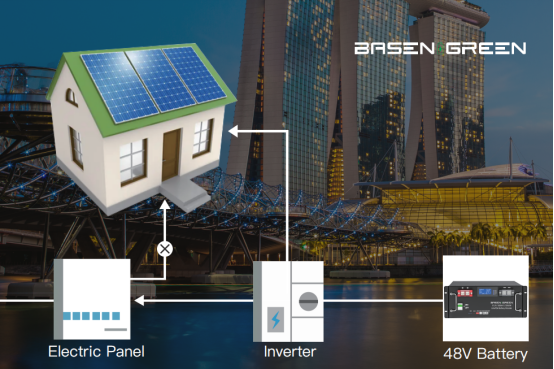4 Benefits of Solar Home Storage Systems in 2023
 Mar 27,2023
Mar 27,2023

 Basen
Basen
Solar energy has emerged as a clean and sustainable energy source that can be used in various applications. One of the main advantages of solar energy is its availability, as it is an infinite resource that can be harnessed almost anywhere on earth. However, the intermittent nature of solar energy poses a significant challenge for its widespread adoption, particularly in the residential sector. To overcome this challenge, energy storage systems have been developed to store excess energy generated during sunny hours for use during times when solar energy is not available. This article will discuss the benefits of solar energy storage systems for households.

Advantage 1: Reduced Energy Bills
One of the primary benefits of solar energy storage systems for households is the reduction in energy bills. Energy storage systems enable households to store excess solar energy generated during the day and use it during peak energy consumption periods, such as evenings and early mornings. This means that households can reduce their reliance on the grid, resulting in lower energy bills. In addition, some energy storage systems are designed to automatically switch between the grid and stored solar energy depending on energy demand, further reducing energy bills.
Advantage 2: Improved Energy Resilience
Another significant benefit of solar energy storage systems for households is improved energy resilience. Traditional grid-tied solar systems do not provide backup power in the event of a power outage, leaving households without power until the grid is restored. However, solar energy storage systems can provide backup power during power outages, ensuring that critical appliances such as refrigerators and medical devices continue to operate. This is particularly important for households in areas prone to power outages due to extreme weather events or other emergencies.
Advantage 3: Environmental Benefits
In addition to the financial and practical benefits, solar energy storage systems also offer significant environmental benefits. The use of solar energy as a primary energy source reduces the amount of fossil fuels consumed, resulting in reduced greenhouse gas emissions and air pollution. The use of solar energy storage systems also reduces the demand for energy from the grid, further reducing greenhouse gas emissions and promoting the use of renewable energy.
Advantage 4: Long-term Cost Savings
While solar energy storage systems require an upfront investment, they offer long-term cost savings compared to relying solely on grid energy. By reducing reliance on the grid, households can avoid fluctuating energy prices and the cost of transmission and distribution. Solar energy storage systems also have a long lifespan, with some systems lasting up to 20 years or more, resulting in long-term cost savings for households.
Conclusion
Solar energy storage systems offer numerous benefits for households, including reduced energy bills, improved energy resilience, environmental benefits, and long-term cost savings. As the technology continues to advance and become more affordable, more households are expected to adopt solar energy storage systems, further reducing their reliance on the grid and promoting the use of clean and sustainable energy sources.








 HOME
HOME The School Funding Robotics Classes by Selling Its Own Solar Energy
The School Funding Robotics Classes by Selling Its Own Solar Energy  You May Also Like
You May Also Like

 Tel
Tel
 Email
Email
 Address
Address